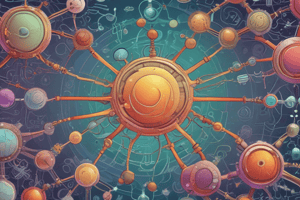Podcast
Questions and Answers
Which mechanism of drug movement requires a carrier and energy?
Which mechanism of drug movement requires a carrier and energy?
- Active transport (correct)
- Passive diffusion
- Pinocytosis
- Facilitated diffusion
Which mechanism of drug movement does not require a carrier or energy?
Which mechanism of drug movement does not require a carrier or energy?
- Pinocytosis
- Active transport
- Passive diffusion (correct)
- Facilitated diffusion
Which mechanism of drug movement is necessary for the transport of endogenous compounds with slow movement by simple diffusion?
Which mechanism of drug movement is necessary for the transport of endogenous compounds with slow movement by simple diffusion?
- Active transport
- Facilitated diffusion (correct)
- Passive diffusion
- Pinocytosis
What is the main mechanism for transport of the majority of drugs in the body?
What is the main mechanism for transport of the majority of drugs in the body?
Which mechanism involves the transport of drugs by being engulfed within molecular vesicles?
Which mechanism involves the transport of drugs by being engulfed within molecular vesicles?
Which mechanism of drug movement involves the movement of a drug molecule according to concentration gradient?
Which mechanism of drug movement involves the movement of a drug molecule according to concentration gradient?
Which type of drug is less ionized in an acidic medium?
Which type of drug is less ionized in an acidic medium?
What is the definition of pKa?
What is the definition of pKa?
Which barrier primarily allows drugs to cross by simple diffusion?
Which barrier primarily allows drugs to cross by simple diffusion?
What does the blood-brain barrier mainly protect against?
What does the blood-brain barrier mainly protect against?
Which factor determines the extent of drug absorption through the placental barrier?
Which factor determines the extent of drug absorption through the placental barrier?
What determines the passage of a drug across a cell membrane?
What determines the passage of a drug across a cell membrane?
What is the main function of the blood-brain barrier?
What is the main function of the blood-brain barrier?
Which type of drug is less ionized in an alkaline medium?
Which type of drug is less ionized in an alkaline medium?
Flashcards are hidden until you start studying
Study Notes
Mechanisms of Drug Movement
- Active transport requires a carrier and energy.
- Passive transport does not require a carrier or energy.
- Facilitated diffusion is necessary for the transport of endogenous compounds with slow movement by simple diffusion.
- Passive transport is the main mechanism for the transport of the majority of drugs in the body.
Transport Mechanisms
- Endocytosis involves the transport of drugs by being engulfed within molecular vesicles.
- Simple diffusion involves the movement of a drug molecule according to its concentration gradient.
Drug Ionization
- A basic drug is less ionized in an acidic medium.
- The pKa is the pH at which a drug is 50% ionized and 50% non-ionized.
Barriers to Drug Movement
- Lipid-soluble drugs can cross the blood-brain barrier by simple diffusion.
- The blood-brain barrier mainly protects against the passage of hydrophilic substances.
- The extent of drug absorption through the placental barrier is determined by the drug's lipophilicity.
- The passage of a drug across a cell membrane is determined by its lipophilicity and the concentration gradient.
- The main function of the blood-brain barrier is to protect the central nervous system from toxic substances.
- An acidic drug is less ionized in an alkaline medium.
Studying That Suits You
Use AI to generate personalized quizzes and flashcards to suit your learning preferences.




